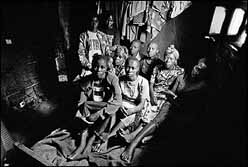About 180 academics, journalists, activists, politicians and NGO workers assembled in Johannesburg from 12 to 14 September to discuss the representation of women in the media. On the invitation of Gender Links and MISA (Media Institute of Southern Africa) participants from eighteen countries attended a Media and Gender Summit in order to exchange experiences and set up an international network.
Gender study
The focus was on the most effective strategies to achieve greater attention for gender-related issues and enhancing the representation of women in the media. A Gender Links and MISA commissioned Gender and Media Baseline Study from 2003 provided the basis of almost every debate.
The study showed that, on average, women in southern Africa constitute 17 per cent of the news sources consulted and that they are often portrayed in marginal or traditional roles.
Social issues strongly affecting the lives of women seldom feature on the political agenda. The conference organisers hope to be able to change this through the media.
Gender Links has organised courses, workshops and trainings for journalists as well as politicians. The issue has meanwhile been put on the agenda by many relevant bodies.
In various countries in the region networks have been created with the aim of promoting attention to women. The media are being lobbied and, for instance, radio stations aimed especially at women have been successfully initiated.
"Seeing the energy in this room and realising what has been achieved in the past two years, I am certain that we will be able to bring about great changes in the years to come," Gender Links manager Colleen Lowe Morna said in her encouraging inaugural address.
Echoes
Media reporting of elections in Malawi, South Africa and elsewhere shows, however, that equal representation in the media has certainly not been accomplished yet. There still is a lack of attention to women’s issues in political campaigns.
Elections are generally found to be excellent occasions to put women’s issues high on the political agenda. The elections to be held in Namibia in November have prompted the Polytechnic Namibia in Windhoek to start a pilot project.
With the support of NiZA, among other organisations, students at the Media Technology department run a press agency called Echoes News Service. The aim is to bring about more democratic reporting and promote balanced reporting on gender issues.
The students operate in nine different parts of the country. A number of topics were selected after discussions with the local population, surveys and interviews. Reports on issues such as HIV/Aids, education and discrimination are offered or sold to newspapers and distributed through the national news agency.
Test
"Press reporting in Namibia is to a large extent defined by the state. The limelight is almost always on the President and the Cabinet; what is going on among the population remaining in the dark. We try to change this with this project," said Polytechnic of Namibia’s Pauliina Shilongo.
"Besides studying with us, our students work already in the media, which means that the project is run by professional journalists. They have completed three years of study during which the university paid much attention to democracy and balanced reporting on gender."
"The project is also a test. What have the students learned from these theoretical courses? Do they realise that a balance should be sought between men and women as sources of news?"
Awards
 |
| copyright: Lori Waselchuck || click to enlarge |
At the conference awards were presented to ten journalists who had successfully and in a constructive manner addressed gender and women’s issues in the media.
Lori Waselchuk from South Africa won the first prize in the photographic category with her series of pictures entitled ‘From the Heart of Darkness’, consisting of portraits of women who had survived the violence in the Democratic Republic of the Congo.
The jury commended the point of view the photographer had chosen. "The lens of Waselchuk captures women who are victims, but also survivors. Rare images coming out of the ravages of war; images that tell the story but are emotionally engaging as well." Ellen Hollemans is one of six recently graduated journalists who are gaining working experience in South Africa via the Media Programme of NiZA. Hollemans is currenty working at Seipone Productions in Johannesburg.
More information:
Genderlinks
Polytechnic of Namibia

